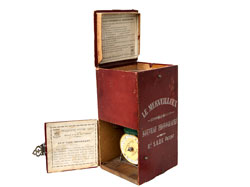
Home
grammophon.ch
grammophon.ch
|
Deutscher Text Henri Lioret (1848-1938) lebte als angesehener Uhrenmacher in Paris. An der Weltausstellung von 1889 faszinierten ihn besonders Edison‘s Phonographen. Bereits 1893 stellte Lioret einen eigenen Phonographen her, der in Puppen eingebaut werden konnte. Als Antrieb diente ein Uhrwerk, als Tonträger eine Walze aus Kunststoff und als Klangverstärker ein Kegel aus Karton und Zelluloid. Dieses Gerät wurde weiterentwickelt und kam 1895 als Lioretograph Nr.1 auf den Markt und wurde etwa während sechs Jahren gebaut und vertrieben. Solche Lioretographen wurden nun auch in Uhren, Automaten der Firma Vichy, in Werbe-Artikel wie kleine Plakatsäulen aus Blech eingebaut. Besonders beliebt war das Modell "Le Merveilleux". Dieser kleine Phonograph befindet sich in einem Pappkarton, das mit bordeauxrotem, Kunstleder ähnlichen Material überzogenen wurde. Vom Phonographen "Le Merveilleux" wurden etwa 1'000 - 1'300 Stück angefertigt. Erhalten geblieben sind von diesem fragilen Gerät sind heute aber nur eine Handvoll Exemplare. Der Verkaufspreis inklusive zwei Zylindern betrug 20 Francs. Ersatz-Zylinder kosteten 2.50 Francs. Typisch für dieses Gerät ist der Motor mit den Geschwindigkeits-regulierenden
Flügelblätter und die gut sichtbaren Betriebsanleitungen.
Die Zylinder wurden aus Zelluloid angefertigt und haben eine Spieldauer
von 30 Sekunden. |
English Text Henri Lioret (1848-1938) lived as a watchmaker in Paris. At the Universal Exhibition of 1889 he was fascinated especially by Edison's phonographs. As early as 1893, Lioret produced his own phonograph, which could be incorporated into dolls. This phonograph is powered by a small clockwork and the sound is amplified by a resonator made of cardboard and celluloid. This device was developed in 1894 and became finaly on the market as Lioretograph No.1. It was built and sold about for six years. Such Lioretograph were now built into clocks, automatas by Vichy, in promotional items made of sheet metal. Especially popular was the model "Le Merveilleux". This little phonograph built into a cardboard box is covered with burgundy red, leather-like material. Maybe about 1,300 "Le Merveilleux" were made. But today, only a handful of originals have been preserved of this fragile device. The sale price includes two cylinders was 20 francs. Replacement cylinder costs 2:50 francs. Typical of this unit is the motor with the speed regulating rotor blades and the operating instructions clearly visible. The cylinders were made of celluloid and have a duration of 30 seconds.
|
